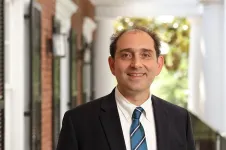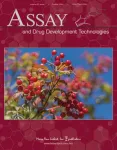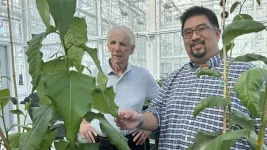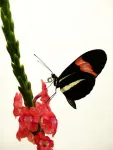(Press-News.org) STARKVILLE, Miss.—Mississippi State University is part of a European-American collaboration studying how human activities, like fertilizer use and polluting, are impacting nitrogen-fixing plants which are crucial for maintaining healthy ecosystems by adding nitrogen to the soil.
MSU Assistant Professor Ryan A. Folk of the Department of Biological Sciences co-authored a study published today [Oct. 18] in Science Advances, showing that increased nitrogen deposition from human activity is reducing the diversity and evolutionary distinctiveness of nitrogen-fixing plants. Lead author Pablo Moreno García, at the University of Arizona, said excessive nitrogen from agriculture and industry makes nitrogen fixers less competitive, leading to simplified plant communities with fewer species of nitrogen fixers.
Folk said, “While others predicted climate change might benefit nitrogen fixers, our research shows this has not happened. Humans are changing Earth in multiple ways that affect nitrogen fixers, and nitrogen deposition is overwhelming as a harmful effect. Nitrogen, the first number listed on a bag of fertilizer, is often the most important plant macronutrient in natural and agricultural systems, so the loss of these plants threatens both biodiversity and ecosystem stability.”
To read more about the research, click here.
For more information about MSU’s College of Arts and Sciences or the Department of Biological Sciences, visit www.cas.msstate.edu or www.biology.msstate.edu.
Mississippi State University is taking care of what matters. Learn more at www.msstate.edu.
END
Loss of ‘nitrogen fixers’ threatens biodiversity, ecosystems
2024-10-18
ELSE PRESS RELEASES FROM THIS DATE:
UH Energy Transition Institute launches radio show and online webinars focused on addressing grand challenges in energy
2024-10-18
HOUSTON, Oct. 18, 2024 –The University of Houston Energy Transition Institute is launching two educational series focused on exploring the unfolding energy transition and addressing the grand challenges in energy.
Starting October 21, "Driving the Energy Transition," will air on Houston Public Media’s KUHF News 88.7 with new episodes launching every two weeks on Mondays. The following day, October 22, the Energy Transition Webinar series will begin, running biweekly on ...
UVA professor tackles graph mining challenges with new algorithm
2024-10-18
University of Virginia School of Engineering and Applied Science professor Nikolaos Sidiropoulos has introduced a breakthrough in graph mining with the development of a new computational algorithm.
Graph mining, a method of analyzing networks like social media connections or biological systems, helps researchers discover meaningful patterns in how different elements interact. The new algorithm addresses the long-standing challenge of finding tightly connected clusters, known as triangle-dense subgraphs, within large networks — a problem that is critical in fields such as fraud detection, computational biology and data ...
Announcing the new editor-in-chief of ASSAY and Drug Development Technologies
2024-10-18
New Rochelle, NY, October 17, 2025—Mary Ann Liebert, Inc., is pleased that Wai Hong (Kevin) Lo, PhD, has been appointed the new Editor-in-Chief of the journal ASSAY and Drug Development Technologies. Dr. Lo is replacing Bruce Melancon, PhD as Editor-in-Chief.
ASSAY and Drug Development Technologies provides access to novel techniques and robust tools that enable critical advances in early-stage screening. This research published in the Journal leads to important therapeutics and platforms for drug discovery and development. This peer-reviewed journal features original papers application-oriented technology reviews, topical issues on ...
Finding could help turn trees into affordable, greener industrial chemicals
2024-10-18
EMBARGOED FOR RELEASE UNTIL 2 P.M. EDT ON FRIDAY, OCT. 18
Trees are the most abundant natural resource living on Earth’s land masses, and North Carolina State University scientists and engineers are making headway in finding ways to use them as sustainable, environmentally benign alternatives to producing industrial chemicals from petroleum.
Lignin, a polymer that makes trees rigid and resistant to degradation, has proven problematic. Now those NC State researchers know why: They’ve identified the ...
UTA to host discussion on Texas energy needs
2024-10-18
The University of Texas at Arlington will host GridNEXT DFW 2024: Meeting the Demand, an event dedicated to envisioning the future of energy infrastructure, on Oct. 25 from 9 a.m. to 3 p.m.
The one-day seminar will bring together industry partners, leaders, government officials and private stakeholders across the Texas energy space to discuss growing power needs and how to better support the Texas power grid.
It will be held at UTA’s Rio Grande Ballroom, 300 W. First St. in Arlington. Woody Rickerson, ERCOT senior vice ...
Preventive medicine professors part of collaborative grant for AI system to enhance Alzheimer's caregiving
2024-10-18
Jennifer Martindale-Adams, EdD, and Linda Nichols, PhD, professors in the Department of Preventive Medicine in the College of Medicine at the University of Tennessee Health Science Center, are members of a team led by Xiaopeng Zhao, PhD, professor in the Department of Mechanical, Aerospace, and Biomedical Engineering at the University of Tennessee, Knoxville, that was recently awarded $401,090 grant from the National Institute on Aging for the development of the RISE project, “Robot-based Information and Support to Enhance Alzheimer’s Caregiver ...
Tropical mammals react to changes in lunar light
2024-10-18
The full moon has a bad reputation for bringing out the worst in people, from werewolves to lunatics. However, it turns out that the lunar cycle can impact behavior – at least in tropical mammals.
New research appearing in the Proceedings of the Royal Society B reveals that half of the mammal species in tropical forests adjust their behaviors in response to the moon's phases and corresponding variations in light.
By Caleb Hess, Cathrine Glosli
Michigan State University ecologist Lydia Beaudrot, who studies tropical ecology and conservation, was among the international cohort of researchers who contributed to the study. ...
Pennington Biomedical’s EAT2 study to explore unknown effects of weight fluctuations
2024-10-18
Dr. Ursula White, an associate professor of Clinical Science at Pennington Biomedical Research Center, is taking a deep dive into the lasting health effects of short-term weight gain and weight loss. The ability for the fat tissue to expand or contract to accommodate changes in body weight is important for sustained health. Dr. White’s clinical study at Pennington Biomedical, the EAT2 study, will allow her to explore how changes within the adipose tissue are affected by weight gain and weight loss, and what that means for a person’s health.
The EAT2 study is recruiting participants now, and participants will be randomly assigned ...
Butterfly brains reveal the tweaks required for cognitive innovation
2024-10-18
A species of tropical butterfly with unusually expanded brain structures display a fascinating mosaic pattern of neural expansion linked to a cognitive innovation.
The study, published today in Current Biology, investigates the neural foundations of behavioural innovation in Heliconius butterflies, the only genus known to feed on both nectar and pollen. As part of this behaviour, they demonstrate a remarkable ability to learn and remember spatial information about their food sources—skills previously connected to the expansion of a brain structure called the mushroom bodies, responsible for learning and memory.
Lead author Dr Max ...
Time to sustained recovery among outpatients with COVID-19 receiving montelukast vs placebo
2024-10-18
About The Study: In this randomized clinical trial of outpatients with mild to moderate COVID-19, treatment with montelukast did not reduce duration of COVID-19 symptoms. These findings do not support the use of montelukast for the treatment of mild to moderate COVID-19.
Corresponding Author: To contact the corresponding author, Susanna Naggie, MD, MHS, email susanna.naggie@duke.edu.
To access the embargoed study: Visit our For The Media website at this link https://media.jamanetwork.com/
(doi:10.1001/jamanetworkopen.2024.39332)
Editor’s Note: Please see the article for additional information, including other authors, author ...







